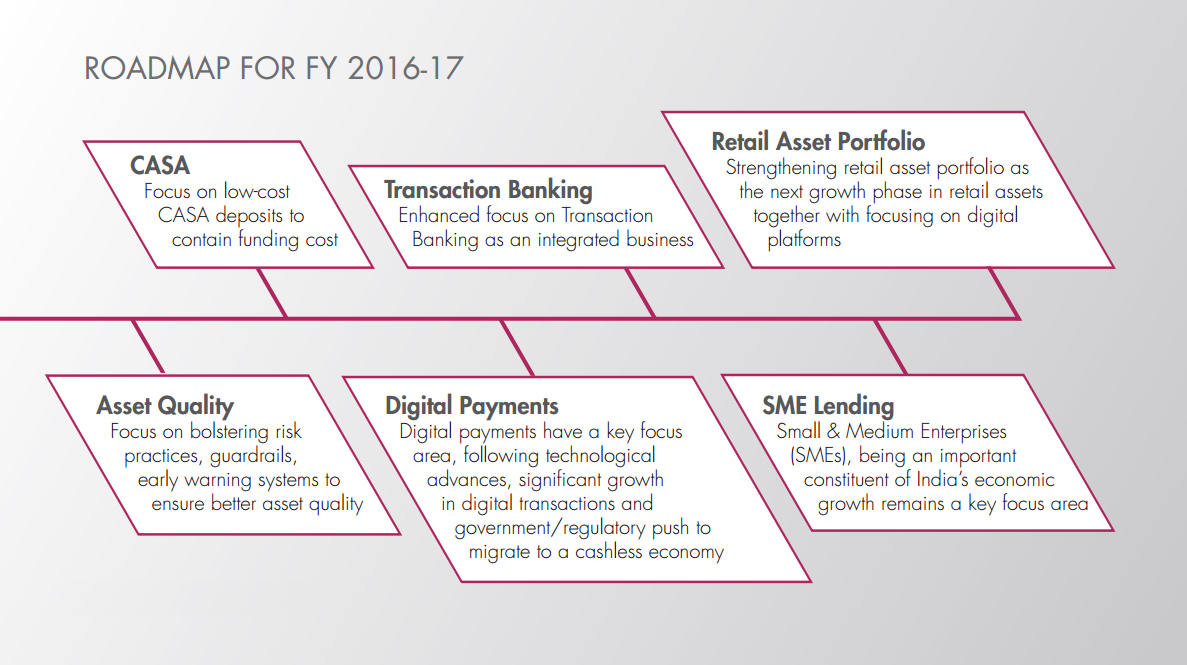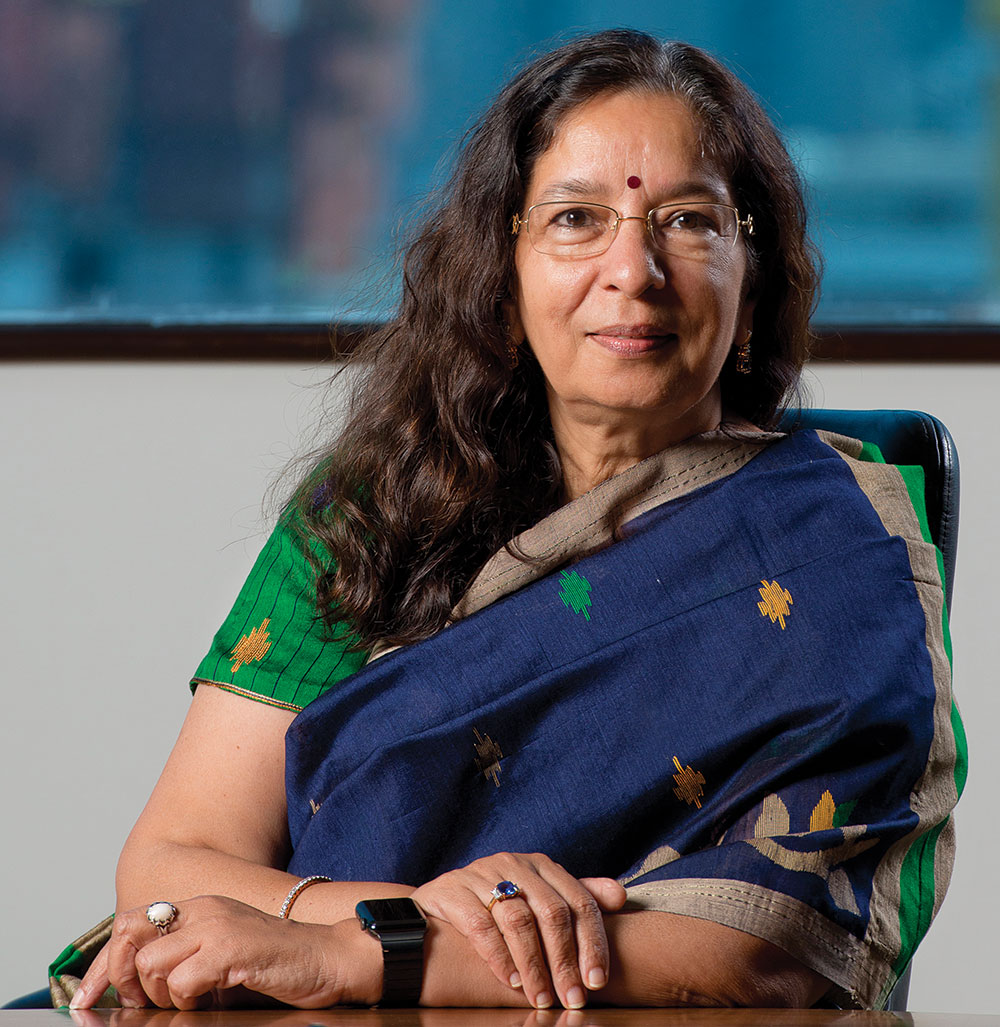DEAR SHAREHOLDERS,
India�s macroeconomic fundamentals have continued to improve. This positions us well among the leading emerging economies. Progress has primarily been driven by continuation in government policy initiatives and benefits of a sustained regime of low commodity prices, leading to improvement in the current account deficit, lower inflation and robust foreign exchange reserves.
The retail segment continues to show steady progress. However, corporate investments remain slow as capacity utilisation continues to be modest, balance sheets are stretched and global growth environment remains uncertain. This has impacted bank balance sheets in the form of deterioration in asset quality. During the year, the RBI undertook a comprehensive Asset Quality Review across all banks for appropriate recognition and resolution of stress in the system.
Our strategy of diversifying the business mix and sustained focus on deepening our low-cost deposit franchise has helped us deliver steady performance during the year. The Bank�s retail businesses grew steadily and there was healthy growth in both retail deposits and loans, supported by an expanding network that remains critical to our retail franchise. Our investments in the most relevant technologies, the right talent and above all, a customer-centric approach have helped us to successfully deliver on our strategy over the years.
The Bank delivered a core operating profit growth of 21% and a net profit growth of 12% during the year. Despite asset quality challenges and higher provisioning requirements, we have continued to deliver a healthy RoA of 1.72% and RoE of 17.49%. The Bank�s book value has steadily increased by a CAGR of 16% over the last three years.
The Bank is well capitalised and our current Tier-I ratio is higher than what it was three years ago, i.e. after when we raised capital in early part of Calendar Year 2013. During this period, all our capital needs in terms of growth, risk movements in the environment and regulatory changes have been met through our internal accruals and efficient capital allocation strategies.
As a part of the RBI�s Asset Quality Review, a list of accounts for Axis Bank was identified by the RBI as potentially at risk from an industry perspective, and was shared with us. The Bank recognised the necessary impairment and the resultant provisioning impact of the asset reclassification as per the RBI�s assessment in the third quarter of the fiscal year. The Bank has witnessed higher stress over the last couple of years emanating from the corporate banking segment. Gross NPA has increased from 1.34% as on 31 March, 2015 to 1.67% as on end March 2016; and Net NPA Level increased from 0.44% to 0.70%.
The Bank delivered a core operating profit growth of 21% and a net profit growth of 12% during the year.
The Bank is cognisant of the challenges faced by the sector and expects a turnaround in the asset quality situation to be gradual. The genesis for most of the asset quality issues lies in a combination of factors like slower economic growth, certain project specific issues and a global commodity slowdown. These factors have also impacted the stress levels in the Bank. In the interest of transparency we have shared a watch list of accounts which is likely to be the key source of future stress coming from the corporate loan book over the next two years. The Bank would like to maintain its provision coverage around current levels and also build up contingent provision buffers at every opportunity.
The Bank�s business model over the years has had infrastructure lending and project financing as important components. During this cycle, these exposures have seen significant distress and contribute to the watch list. However, the Bank has over the last few years successfully diversified its loan book with Retail and SME contributing almost 55% of total loans. It has further improved its risk management and credit monitoring frameworks. An enterprise wide risk governance and risk appetite framework has been implemented, which now ensures much more granular portfolio level risk management within the Bank. We have also been incrementally focusing more on higher rated corporate business over the past few years. We expect that the measures adopted by the Bank, coupled with economic recovery and the proposed government mechanisms for asset resolution, including the Bankruptcy Code, will go a long way in arresting the asset quality challenges and also help in providing resolutions over the medium term.
Our aim is to be a full service bank offering the entire gamut of banking products and services to our retail as well as the small, medium and large corporate customers. The payment space remains a key area of interest for us; and we continue our sustained focus on government business, cash management and on our strong transaction banking capabilities. Within this, it has been our endeavour to constantly redefine our overall customer experience by introducing new products and services; and tweaking existing processes to provide customers with an easy, seamless and omni-channel interface. We strongly believe in doing things that customers truly care for and doing it in the simplest possible way
India�s financial sector landscape is evolving rapidly. Customers are increasingly weaving their digital and physical worlds together with transactions being conducted seamlessly using multiple channels. At our Bank too, we continue to see strong momentum towards the adoption of digital channels by our customers. The transaction volumes on our award winning mobile application (Axis Mobile) have gone up almost four times compared to that of last year, outpacing every other channel by a wide margin.
Electronic channels now contribute 87% of all customer induced transactions in our retail base. However, we believe that branches will continue to play a key role in customer acquisition, providing localised services to our customers and we shall continue to build and nurture this franchise. We have opened 315 new branches this fiscal year and will continue to make adequate investments in our branch network infrastructure going forward.
Although banks have been extending their network to reach out to new geographies and customers, the penetration of household banking services remains low in the country. The emergence of a new class of banks - Small and Payment Banks will help accelerate financial inclusion by making the last-mile access more costeffective and expanding the reach of banking to the unbanked. With the advent of new players, two macro themes will evolve over time. Customers who are currently not a part of the formal financial architecture will get included; and secondly, as consumers realise the convenience of using technology-enabled alternate banking channels, the economy will see a gradual reduction in cash intensity. Both these factors will have a positive impact on the financial sector as a whole.
The new banks will start finding niches for themselves to operate in this increasingly competitive environment. On the other hand, the incumbent banks will also find immense opportunities to leverage on the brand value, network, technology and capabilities that they have built over the years to launch new products and services to their existing and prospective customers and increase activity levels in customer accounts through big data analytics and cross sell.
I believe India is on the cusp of an explosion in entrepreneurship. Supported by a growing entrepreneurship culture, a proactive government and rising availability of financing, young entrepreneurs are unleashing a wave of start-up ideas. Learning how to serve these businesses and offering a full product suite present a huge opportunity for banks, both old and new. In this regard, we have created a new business vertical (the New Economy Group) within our Corporate Banking that aims to foster relationships with e-commerce companies and start-ups, through a relationship-driven comprehensive coverage model. There is a whole new ecosystem that is being built on the backbone of technology, innovation and enterprise. We are engaging with many of these new companies with our investment banking solutions, banking products, meeting their transaction banking needs and serving their customers. In some markets, we are partnering with these new companies to fund their suppliers. We hope to be a prominent financial services provider in this new and evolving environment. A good example is Trade Receivables financing. Axis Bank is one of the three entities which have been chosen to implement the Trade Receivables Discounting System (TReDS) platform for facilitating cash flows for SMEs.
This year the fury of nature was witnessed with devastating consequences, be it the earthquake in Nepal or the floods in Chennai. The Axis Family and Axis Bank Foundation in co-ordination with their NGO partners immediately rallied behind the affected people in whatever way they could. Around 8,000 Chennai flood victims were provided food, clothes and immediate first aid. We are happy to have played a role in alleviating their hardship.

With a growing entrepreneurship culture, supportive proactive Government and growing availability of financing, India, the world�s largest democracy, is poised for robust economic development.
The rise in number of extreme weather events that we are witnessing across the country further substantiates the fact that climate change has become a harsh reality. As a responsible Bank, we acknowledge our role in supporting economic growth as well as in ensuring environmental sustainability. During the last few years, we have embarked on multiple initiatives to help reduce our direct environmental impact and we will continue to explore more of such avenues. We remain committed to our sustainability framework and will actively promote the integration of environmental sustainability and community development in all our operational policies and lending decisions.
No organisational objective can be achieved without the spirit of perfect teamwork and strong collaboration of its employees. The various awards that the Bank was bestowed upon this fiscal year were testaments of the wholehearted commitment of our 50,000+ employees spread across the country. I am happy to share that Axis Bank is one of the two Indian banks to have featured in the �Top 75 safest banks� in the world by The Banker magazine. The Certificate of Recognition for Excellence in Corporate Governance by the Institute of Company Secretaries of India is another significant achievement for us as an institution.
Our efforts to constantly innovate and invest in new technologies for the future received further encouragement by winning the Best Bank Award for Digital Banking, Analytics and Big Data among large banks awarded by the Institute for Development and Research in Banking Technology (established by the RBI).
Fiscal year 2016 has been a good year for all our subsidiaries, as witnessed by healthy growth in revenue and earnings of 38% and 29%, respectively. Axis Capital continues to be one of the leading investment banks in India. Axis Asset Management Company (AMC) gained market share during the year and is now ranked 11th in assets under management among participants in the mutual funds industry. The AMC and Retail Brokerage businesses are also contributing towards the Bank�s Retail Franchise building strategy by creating value for Axis Family customers.
With a growing entrepreneurship culture, supportive proactive Government and growing availability of financing, India, the world�s largest democracy, is poised for robust economic development. We remain confident of the Bank�s ability to leverage its strong retail and corporate franchises; and take advantage of the opportunities that may emerge as the economy gains momentum. Meanwhile we will continue to build our infrastructure, invest in technology and human capital to support our business growth.
I wish to take this opportunity to thank all our stakeholders, past and present, for supporting us; and reiterate our commitment to delivering value to all our stakeholders.
SHIKHA SHARMA
Managing Director & CEO


